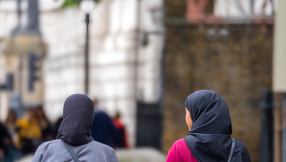Religious freedom campaigners are pressuring a school in California to apologise for apparently telling a 6-year-old child that "Jesus is not allowed in school".
The controversy arose because first grader Isaiah Martinez wanted to share a specifically Christian Christmas message with his classmates at Merced Elementary in San Bernardino County, in the West Covina Unified School District.
He and his 21-year-old sister Alexandra planned to do this by buying candy canes and then tying notes to them with a little message that contained an explanation of the so called "Legend of the Candy Cane" that highlights religious symbols supposedly present in the confection's design, and suggests they were intentionally put there by its American inventor.
Isaiah Martinez was determined to share this story with his classmates but was left disappointed when his teacher, Valerie Lu, told him that he could not distribute the canes to his 24 classmates with the message attached.
Ms Lu reportedly removed the tags with the message laden and threw them away in front of Isaiah.
Despite Alexandra's attempts to convince the school's principal, Gordon Pfitzer, that Isaiah's first amendment rights to freedom of expression were being violated, the decision was not reversed.
Although Isaiah was not able to share his gifts as part of the end of year gift giving party, other children were allowed to exchange gifts bearing acceptable secular messages of Christmas cheer.
The Faith and Freedom pressure group is inviting people to send a copy of its letter criticising the decision to Merced Elementary School.
In the letter, they argue that Isaiah's first amendment rights could not be removed just because he is a young child in school.
The cite the case of Tinker v. Des Moines Independent Community School District, where children who defied uniform policy and wore black armbands to school in protest of the Vietnam War were vindicated by the Supreme Court. The Court ruled at the time: "It can hardly be argued that either students or teachers shed their constitutional rights to freedom of speech or expression at the schoolhouse gate."
The letter concludes that if no apology or retraction is received by 13 January, advocates for Faith and Freedom will take legal action against the school.
Robert Tyler, lawyer and General Counsel for Advocates of Faith and Freedom said the group had experienced a "surge" in phone calls from students and their parents across the country who have experienced religiously motivated bullying.
"Not bullying by other students, but bullying by teachers and school officials," he said.
"The pendulum has swung so far in the opposite direction that public schools are becoming a place of hostility toward Christian and other religiously-based worldviews.
"It's time to push the pendulum back in the right direction where kids can experience true tolerance without religiously motivated hostility from their teachers and school officials."
Professor Eugene Volokh, who teaches separation of Church and State law at UCLA is quoted on NotYetNews.com as saying that the district is likely to lose if it chooses to defend itself legally.
"For some reason, schools seem to be labouring under the misconception that they have to, or that they are allowed to, suppress religious speech," Volokh said.
"Schools can't engage in their own religious speech, but they also can't suppress the religious speech of others… just as you can't prevent a pro-environmental message from being distributed on a candy cane."
However, Loyola Law School professor Aaron Caplan, also speaking on NotYetNews.com, argued that the decision was more nuanced than at first it may appear.
"We have two values that are both important," he said. "One value is that government should not be playing favourites when it comes to religion … the second value is that students have a right to say what they want."
He added that the outcome "depends on what the school's ground rules were for the event".
"If the school allowed students to bring whatever they wanted to give to one another, then it would be improper for the school to place limitations on just one type of gift. But if the school restricted gifts or messaging, then it has to be religiously neutral," he said.
"Does the school really want to have a policy where, say, students can distribute white supremacist messages around a candy cane? Schools will say this is not a complete free speech zone, there are boundaries. Part of the legal question is, what are those boundaries?"
The legend of the candy cane says that a confectioner from Indiana created the cane as a sweet based symbol of Jesus, with the following meanings built in:
• It's a hard rock, symbolising the firm foundation that is Jesus
• It's white to symbolise the purity of the Virgin Birth
• The red stipe represents the blood of Jesus which makes eternal life possible
• The J shape is said to represent Jesus
• It's also the shape of a shepherd's crook, because Jesus was the good shepherd.
The historicalaccuracy of this story is doubted, with many such as Snopes.com and Smithsonian.com pointing out that candy canes have actually been referenced far earlier in European history, before Indiana was a state. It is possible that these Christian references are real, and that it was a European confectioner and not an American one, though there is so far no concrete evidence to confirm it either way.













